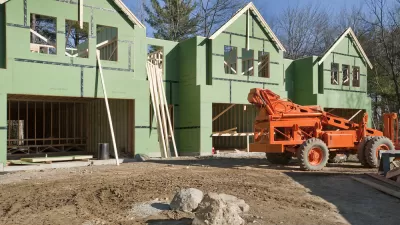An acquaintance of mine is trying to decide whether to move to Los Angeles or New York. Having spent most of her life in the Northeast, New York is a familiar city where she has good friends and job connections. However, she can’t help but feel the draw of the West Coast, and on a recent visit to Los Angeles, she was rather keen on settling down in Southern California, especially when she was comparing the rents in L.A. to those in New York. While rents in New York are increasingly stratospheric, L.A.’s are just exorbitantly high.
An acquaintance of mine is trying to decide whether to move to Los Angeles or New York. Having spent most of her life in the Northeast, New York is a familiar city where she has good friends and job connections. However, she can't help but feel the draw of the West Coast, and on a recent visit to Los Angeles, she was rather keen on settling down in Southern California, especially when she was comparing the rents in L.A. to those in New York. While rents in New York are increasingly stratospheric, L.A.'s are just exorbitantly high.
However, several friends pointed out that since most people in Los Angeles consider a car a necessity, she would need to factor that into her cost of living. Once she did, she realized that living in Los Angeles would actually be more expensive than living in New York. Certainly, it is possible to live in Los Angeles without a car (and many do, including myself). However, as someone who's also lived in a very transit-friendly city (Hong Kong), I'll also be the first to admit living in L.A. without a car is not easy. In New York, the question is sometimes even asked in reverse – why would you want to deal with the hassle of owning a car?
All this got me thinking – how much are the higher rents in New York connected to the fact that you don't need to pay for a private vehicle? And are L.A.'s property owners and landlords losing out on income potential because they and their tenants feel the need to own cars? If so, there seems like a good economic argument for convincing property owners to pay for more transit.
Of course, the idea of financing transit improvements using tax increment financing on property within easy access of improved transit service isn't new. Los Angeles tried this itself when the first stretches of the city's subway were built – establishing benefit assessment districts in and around its downtown. However, these were limited to commercial properties, which stunted their potential. Carefully applied to residential properties, either through property taxes or rents, this concept might be able to capture some of the value that likely is created when investments in transit are made.

Alabama: Trump Terminates Settlements for Black Communities Harmed By Raw Sewage
Trump deemed the landmark civil rights agreement “illegal DEI and environmental justice policy.”

Study: Maui’s Plan to Convert Vacation Rentals to Long-Term Housing Could Cause Nearly $1 Billion Economic Loss
The plan would reduce visitor accommodation by 25% resulting in 1,900 jobs lost.

Planetizen Federal Action Tracker
A weekly monitor of how Trump’s orders and actions are impacting planners and planning in America.

Wind Energy on the Rise Despite Federal Policy Reversal
The Trump administration is revoking federal support for renewable energy, but demand for new projects continues unabated.

Passengers Flock to Caltrain After Electrification
The new electric trains are running faster and more reliably, leading to strong ridership growth on the Bay Area rail system.

Texas Churches Rally Behind ‘Yes in God’s Back Yard’ Legislation
Religious leaders want the state to reduce zoning regulations to streamline leasing church-owned land to housing developers.
Urban Design for Planners 1: Software Tools
This six-course series explores essential urban design concepts using open source software and equips planners with the tools they need to participate fully in the urban design process.
Planning for Universal Design
Learn the tools for implementing Universal Design in planning regulations.
Caltrans
Smith Gee Studio
Institute for Housing and Urban Development Studies (IHS)
City of Grandview
Harvard GSD Executive Education
Toledo-Lucas County Plan Commissions
Salt Lake City
NYU Wagner Graduate School of Public Service






























